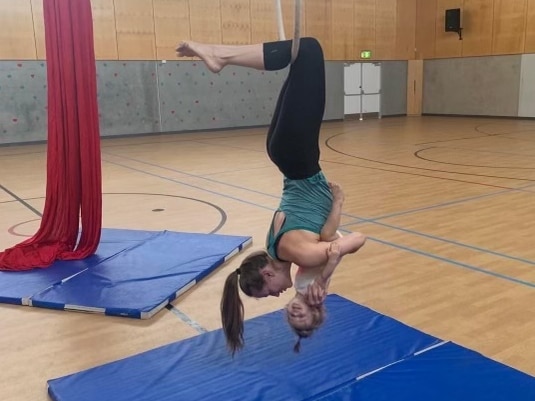Infection
Even healthy people are getting sick with pneumonia this year
More people have been sick this year with pneumococcal infections that can cause pneumonia and meningitis, according to health data from a number of states.
Key points:
- Experts say more people with health immune systems have been sick with pneumonia this year
- Circus performer and mother Caitlyn Larsson had pneumonia for three months this year
- While total infection are up year-on-year in many states, the rate of illness is starting to decline as the weather warms
And an expert say there’s been a spike in pneumonia infections in people with healthy immune systems, as well as in vulnerable groups like the elderly.
Riverland business owner, circus performer and mother Caitlyn Larsson contracted pneumonia in late January.
“I had it for about three months, but I’ve also had bronchitis, tonsillitis and a lot of allergy infections this year,” she said.
“I’ve just been on antibiotics pretty much nonstop.
“I just can’t seem to get better and the doctors don’t know what to do with me.
“I’ve spent so much money on antibiotics, the doctor and driving to see the specialist because I couldn’t get into one [locally] for ages.”
Spread of infection
Notifiable disease reports across the country show pneumococcal infections, which cause a range of illnesses like pneumonia and meningitis, have increased this year.
In South Australia, where Ms Larsson is based, 138 cases of pneumococcal disease have been recorded since the start of the year, compared with 100 cases for the same period last year.
In Queensland, 267 pneumococcal cases have been recorded year to date, compared with an average year-to-date rate of 206 from 2018 to 2022.
Just over 450 cases have been recorded in New South Wales from January 2023 to the end of August this year, compared with 352 in the state for the same period in 2022.
And Victoria has recorded 494 pneumococcal infections in the past 12 months, or 351 in the year to date, compared with a total of 444 cases for all of 2022.
Pneumonia is often thought of as an infection primarily contracted by vulnerable people, but Robert Booy from the University of Sydney said relatively healthy people were getting sick after years of COVID-19 restrictions.
“There’s no doubt we’ve seen a lot more pneumonia in the vulnerable [population] … but also in people who have healthy immune systems because of greater mixing and spread of infection,” Professor Booy said.
“People have also lost some immunity towards viruses or bacteria over two to three years of not mixing together.”
What is pneumonia?
Pneumonia is an infection or inflammation of the lungs that can occur when a person gets a virus, bacterial or fungal infection.
But it is not caused by one specific infectious agent such as influenza or COVID-19.
It makes an infected person’s small airways swell up and fills their lungs with fluid, which reduces the amount of oxygen that can move in and out of the body.
As someone who needs to stay fit and healthy for her work, the months of sickness have been difficult for Ms Larsson.
“Trying to do my job with that mountain of snot in your head and always being on antibiotics is really challenging,” she said.
“I had to go on vocal rest and stop talking while I was [performing in a] musical — except for the shows — because my throat was so bad I couldn’t sing.”
Sickness subsides as weather warms
The head of the school of health sciences at the University of Melbourne, Bruce Thompson, said pneumonia was a serious condition that could have lasting effects.
“I remember having it a number of years ago and you end up with a horrible cough and potentially have all the flu-like [symptoms],” Professor Thompson said.
“There is a possibility you can have recurring chest infections, so it’s really important you break that cycle.
“You can vaccinate [against] pneumococcal disease, which is highly effective … and the same COVID-19 prevention measures can help, like hand washing or wearing a mask if you’re not feeling great.”
Professor Booy said fortunately, pneumonia cases were beginning to decrease heading into the warmer months.
“It’s pretty clear already with the increased temperatures and people spending more time outside, we’re seeing less viral respiratory infections and less bacterial pneumonia,” he said.
“The numbers are definitely going down already.”
Loading

